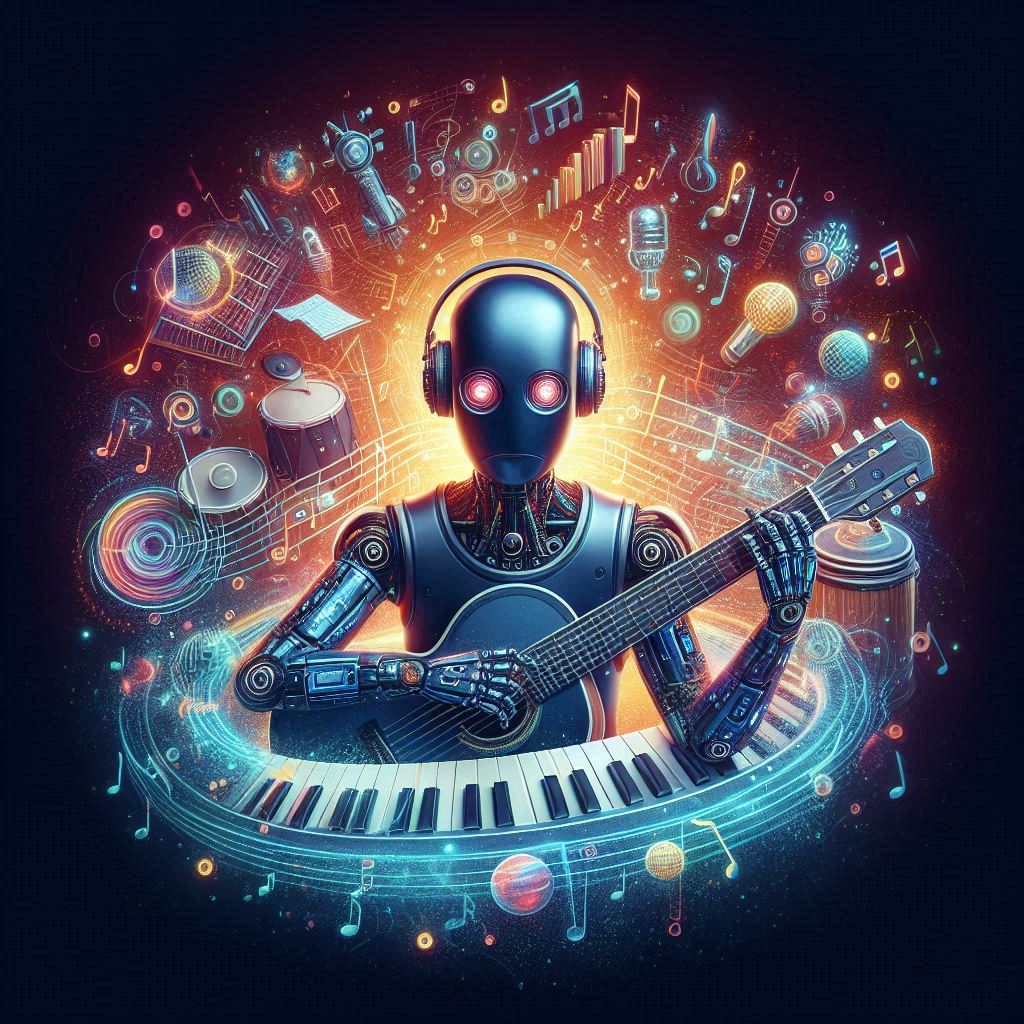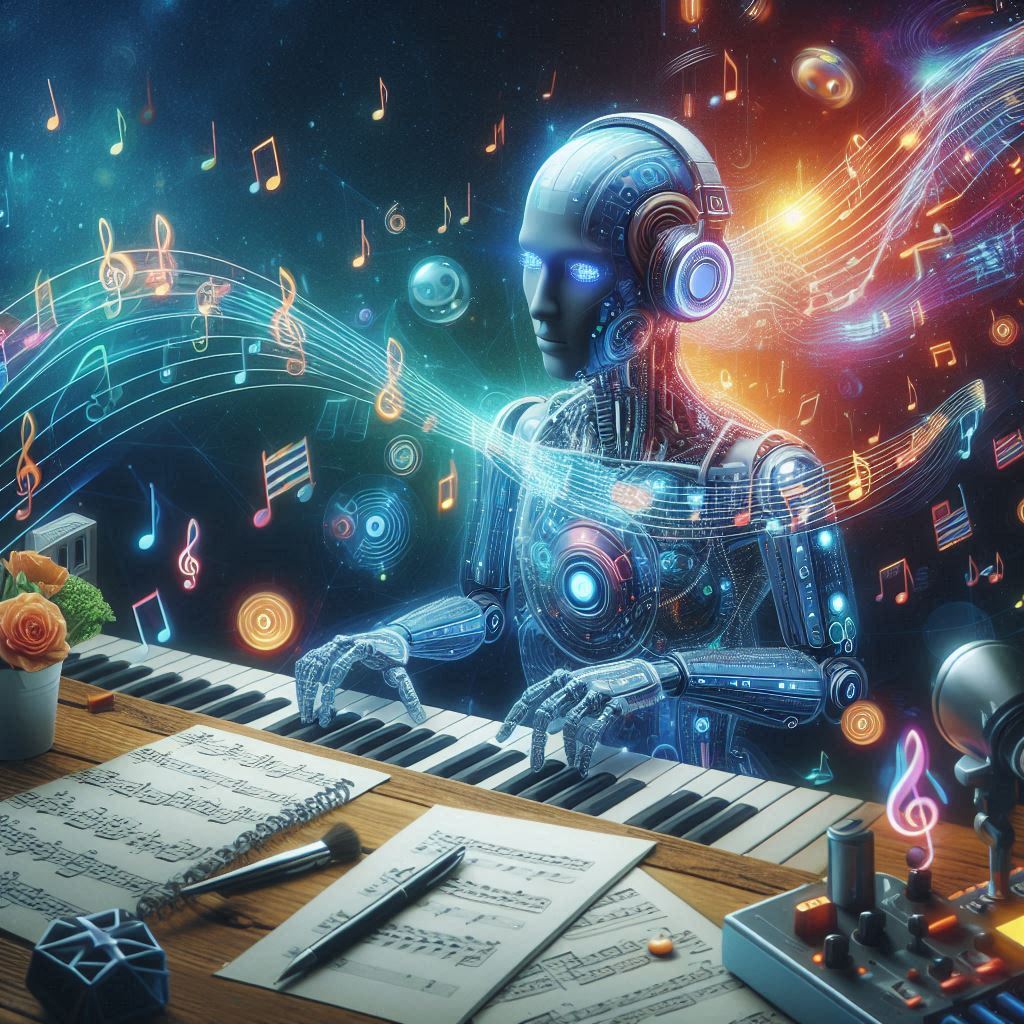AI in Music Composing, Performing, and Redefining Sound
Introduction to AI in Music
AI in Music Composition
AI has made significant strides in music composition, providing tools that assist composers in creating unique and complex pieces. These AI systems analyze vast amounts of musical data to generate compositions that adhere to specific styles or genres. One notable example is the use of AI by the startup Amper Music which allows users to create music by selecting genre, mood, and duration.
AI has indeed made remarkable advancements in music composition, offering powerful tools that assist composers in crafting intricate and personalized pieces. One notable example is Amper Music, a startup at the forefront of AI-driven music creation.
Amper Music’s platform leverages AI to enable users, regardless of their musical expertise, to generate original compositions. Here’s how it typically works:
1. User Interface: Amper Music provides an intuitive interface where users can input parameters such as genre, mood, tempo, and duration. These inputs guide the AI in creating music that aligns with the specified criteria.
2. AI Composition: The AI behind Amper Music analyzes a vast database of musical styles and patterns. It uses machine learning algorithms to understand musical structures and harmonic relationships, enabling it to generate compositions that sound coherent and stylistically appropriate.
3. Customization and Adaptation: Users can further customize the generated music by adjusting elements like instrumentation, rhythm, and intensity. This flexibility allows composers, filmmakers, content creators, and other users to tailor the music precisely to their creative needs.
4. Integration and Collaboration: Amper Music is designed to integrate seamlessly into workflows, making it valuable for creating soundtracks for videos, advertisements, games, and other media. It also supports collaboration, allowing multiple users to work on projects simultaneously.
5. Scalability and Accessibility: By automating the composition process, Amper Music democratizes music creation, making it accessible to a broader audience beyond traditional composers. This accessibility empowers creatives with diverse backgrounds to harness the power of AI in their projects.
Overall, platforms like Amper Music illustrate how AI is transforming music composition by providing innovative tools that streamline the creative process and expand artistic possibilities. As AI technology continues to evolve, we can anticipate further advancements in how AI assists and enhances musical expression across various domains.
| AI Tool | Function | Example |
|---|---|---|
| Amper Music | Generates music based on user inputs | Amper Music |
| Aiva | Composes classical music | Aiva |
| Jukedeck | Creates royalty-free music | Jukedeck |
AI in Music Performance
AI is transforming live music performances by enhancing both the auditory and visual experiences. AI-driven tools are being used to analyze and predict audience preferences, thereby tailoring performances to maximize engagement. Furthermore, AI can be integrated with instruments to create real-time effects and adjustments, as seen with Yamaha’s AI-driven pianos.
| Performance Aspect | AI Application | Example |
|---|---|---|
| Visual Effects | Real-time visual enhancements | Autodesk Immersive Concerts |
| Sound Quality | AI-based sound optimization | Yamaha AI Pianos |
| Audience Engagement | Predicting and adapting to audience preferences | Google Creative Lab |
Redefining Sound with AI
AI is not only aiding in composition and performance but also redefining the very essence of sound. Through deep learning algorithms, AI can create new sounds and soundscapes that were previously unimaginable. This capability is being harnessed in various fields, from creating unique soundtracks for films to developing new musical instruments. For instance, the AI system OpenAI’s Jukebox can generate music in the style of any artist or genre, showcasing the potential of AI in sound innovation.
AI’s impact on sound innovation is profound and multifaceted, extending beyond mere composition and performance to fundamentally redefining how we create and interact with sound. Here are some key ways AI is revolutionizing the field:
1. Composition and Performanc: AI algorithms, particularly those based on deep learning, can analyze vast amounts of musical data and create compositions that mimic the style of specific artists or genres. OpenAI’s Jukebox, for example, can generate music that resembles the works of various musicians, demonstrating AI’s ability to compose in diverse styles.
2. Sound Design and Soundscapes: AI is not limited to creating melodies but can also generate entire soundscapes and ambient environments. This capability is invaluable in fields such as film and gaming, where AI can create immersive audio experiences tailored to specific scenes or gameplay dynamics.
3. New Musical Instruments: AI is facilitating the development of entirely new types of musical instruments that respond to novel forms of interaction or produce sounds that were previously unattainable. These instruments can expand the creative possibilities for musicians and composers.
4. Personalized Music Experiences: AI-powered systems can analyze individual preferences and create personalized playlists or compositions that cater to specific tastes. This personalization extends to adjusting music in real-time based on user feedback or environmental cues.
5. Enhanced Production and Mixing: AI tools can assist in the production and mixing stages of music creation by automating repetitive tasks, improving audio quality, and even suggesting creative enhancements based on learned patterns and preferences.
6. Innovative Soundtracks and Audio Effects: Film, television, and advertising industries are increasingly using AI to generate unique soundtracks and audio effects that enhance storytelling and emotional impact.
Overall, AI’s ability to generate, manipulate, and innovate with sound is reshaping creative industries and opening up new possibilities for artistic expression and audience engagement. As technology continues to advance, we can expect further breakthroughs in how AI interacts with and transforms the realm of sound.
| Sound Innovation | AI Application | Example |
|---|---|---|
| New Sound Creation | Generating novel sounds | OpenAI’s Jukebox |
| Film Scoring | Creating dynamic soundtracks | IBM Watson |
| Instrument Development | Innovating new musical instruments | Magenta by Google |
Pros and Cons of AI in Music
As with any technological advancement, AI in music comes with its own set of pros and cons. Understanding these can help stakeholders make informed decisions about integrating AI into their musical endeavors.
| Pros | Cons |
|---|---|
|
|
Future Trends of AI in Music
The future of AI in music is promising, with ongoing advancements poised to further transform the industry. Emerging trends include the development of more sophisticated AI composers, the integration of AI in personalized music experiences, and the creation of AI-generated interactive music environments. Companies like Aiva and Amper Music are at the forefront of these innovations, continually pushing the boundaries of what is possible with AI in music.

Conclusion
AI is undeniably transforming the music industry, offering unprecedented opportunities for innovation in composition
Pros and Cons of AI in Music
As AI continues to integrate into various sectors, its impact on the music industry has been profound. While AI brings numerous advantages to music creation, performance, and distribution, it also presents several challenges. Understanding these pros and cons can provide a balanced view of AI’s role in music.
Pros of AI in Music
The benefits of AI in the music industry are numerous, contributing to creativity, efficiency, and innovation.
| Pros |
|---|
|
Cons of AI in Music
Despite its many benefits, AI in music also presents several drawbacks and challenges that need to be addressed.
| Cons |
|---|
|
Conclusion
AI is undeniably transforming the music industry, offering unprecedented opportunities for innovation in composition, performance, and sound creation. However, it also presents significant challenges that need to be carefully navigated. Balancing the benefits and drawbacks of AI in music will be crucial in shaping the future of this ever-evolving industry.
FAQs on AI in Music
As artificial intelligence (AI) continues to revolutionize the music industry, many questions arise regarding its impact, capabilities, and future implications. This FAQs section aims to address common queries about AI in music, providing insights into its applications, benefits, and challenges.
What is AI in the context of music?
AI in music refers to the application of artificial intelligence techniques, such as machine learning and deep learning, to various aspects of music creation, performance, and distribution. AI systems analyze large datasets of musical information to generate compositions, enhance performances, and personalize music experiences.
How is AI used in music composition?
AI aids in music composition by generating melodies, harmonies, and entire compositions based on predefined rules or learned patterns from existing music. It can mimic different musical styles and genres, allowing composers to explore new creative avenues and generate complex pieces efficiently.
| AI Tool | Function | Example |
|---|---|---|
| Amper Music | Generates music based on user inputs | Amper Music |
| Aiva | Composes classical music | Aiva |
| Jukedeck | Creates royalty-free music | Jukedeck |
How does AI enhance music performance?
AI enhances music performance by providing real-time analysis and adjustments, improving sound quality, and creating interactive visual effects. AI-driven tools can adapt to audience reactions and preferences, making live performances more engaging and immersive.
| Performance Aspect | AI Application | Example |
|---|---|---|
| Visual Effects | Real-time visual enhancements | Autodesk Immersive Concerts |
| Sound Quality | AI-based sound optimization | Yamaha AI Pianos |
| Audience Engagement | Predicting and adapting to audience preferences | Google Creative Lab |
What are the potential benefits of AI in music?
AI offers several advantages in the music industry, including:
| Pros |
|---|
|
What are the challenges of using AI in music?
Despite its benefits, AI in music faces several challenges:
| Cons |
|---|
|
What are the future trends of AI in music?
The future of AI in music is promising, with ongoing advancements in AI composers, personalized music experiences, and interactive music environments.
| Future Trends | Example |
|---|---|
| AI Composers | Aiva |
| Personalized Music Experiences | Amper Music |
| Interactive Music Environments | Magenta by Google |
Conclusion
AI is reshaping the landscape of the music industry, offering unprecedented opportunities for creativity, efficiency, and innovation. While challenges exist, the continued development and adoption of AI in music promise to enrich musical experiences and redefine artistic boundaries.
Disclaimer: The content provided in this article is intended for informational purposes only. The advancements and applications discussed regarding Artificial Intelligence (AI) in music composing, performing, and redefining sound reflect the current trends and research in the field as of the date of publication. While every effort has been made to ensure the accuracy and reliability of the information, the rapidly evolving nature of AI technology means that new developments and perspectives may emerge. The opinions expressed in this article do not necessarily reflect the views of the authors or the organizations with which they are affiliated. Readers are encouraged to conduct their own research and seek professional advice before making any decisions based on the information provided.


[…] integration of Artificial Intelligence (AI) into live performances has revolutionized the entertainment industry. From concerts to theatrical productions, AI is enhancing the audience experience, optimizing […]
[…] have discovered otherwise. By leveraging sophisticated algorithms, streaming platforms can suggest movies, shows, or music that are outside of the user’s usual preferences but still align with their interests. This […]